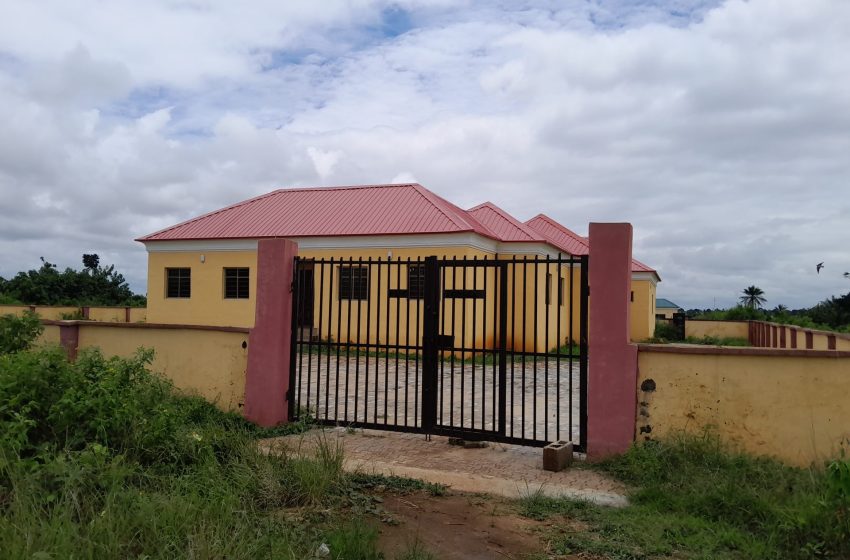INVESTIGATION: Ogun LGA where the sick lack hospital, depend on herbs despite FG’s N64m project

The abandoned project in Ogun LGA
It was a cool afternoon on Saturday, September 10, 2023. After a bumpy and tiring ride from Sango Ota, the motorcyclist conveying this reporter screeched to a halt at Itekun road in Igbesa, Ado-Odo Ota Local Government Area (LGA), Ogun state.
Situated on the hustling and bustling road connecting Igbesa and Itekun, another town in Ado-Odo Ota LGA, is a 20-bed primary health centre (PHC).
In 2022, Gloria Ajayi’s joy knew no bounds when it was announced that the project would be constructed to improve access to quality healthcare in the area.
For long, women, children, and others in the area have experienced nightmares while trying to get quality healthcare.
Gloria, a peasant farmer in the area, told Legit.ng she and others depend on herbal concoctions and services of private healthcare providers when they are sick.
Due to this, hopes blossomed when construction of the project, facilitated by the Office of the Senior Special Assistant to the President on SDGs Nigeria (OSSAP-SDGs), commenced.
But Gloria’s hopes and those of other residents were dashed when the facility was abandoned after completion.
“It has remained this way since they completed it; no one has been able to use it. In this community, we live at death’s mercy,” Gloria lamented.

The multi-million naira project rotting away
The OSSAP-SDGs is responsible for the coordination and policy formulation of programmes designed to achieve the 2030 SDGs Agenda adopted by all United Nations member states in Nigeria. One core of the 17-point agenda adopted by countries in 2015 is good health and well-being.
On October 24, 2022, data from Govspend, an initiative of BudgIT, the Nigerian civic organisation promoting transparency and active citizen engagement, showed the OSSAP-SDGs paid the sum of ₦27,657,262.43 to Ocean Mines and Exploration Ltd to construct one 20-bed PHC with external works at Igbesa town in Ado-Ota LGA, Igbesa, Ogun state.
The same day, the OSSAP-SDGs paid ₦37,349,020.00 to the same company to equip the facility.
Findings by Legit.ng, however, showed that the facility – which should be a game-changer for residents in terms of quality health – is lying fallow.
Over a year after it was awarded and months after its completion, the project has yet to be commissioned.
When the reporter visited the project, parts of the facility had been taken over by bush.
A community leader in Igbesa, identified as Baba Pupa, said the project was designed to benefit residents from 15 areas, including Igbesa and Itekun. He, however, lamented its non-utilisation after completion.
“People have terrible experiences accessing healthcare due to the state of the project. The project was completed around 2022. There are around 15 communities expected to benefit from the project.”
Apart from improving access to healthcare, many residents expected the facility to create job opportunities for them.
“We’re on the lookout for jobs. Sadly, the place is now covered with bushes; it has been furnished. The facility would be of great benefit to us when it becomes functional. At least, cleaners, secretaries, gatemen, among others, will be engaged,” Sade, a trader in Igbesa, said.
No single hospital, herbal concoction to the rescue: Welcome to Ogun LGA
Chief Emmanuel Abiodun, the traditional ruler of Oke-Agbeji, a community in Itekun, is one of those who are livid over the non-utilisation of the project.
“We don’t have a single functional government PHC here at the moment. We depend on patent and proprietary medicine vendors (PPMVs), also known as chemists and other private health care providers when we are sick,” he lamented.
He said about 10 years ago, the community attempted to build a PHC through joint efforts, but the project did not materialise.
Abiodun said the 20-bed PHC by the federal government would have benefited residents of Itekun and other surrounding communities, but its non-utilisation has left people vulnerable to sickness.
“We’re not benefiting from it (the PHC), but God has not abandoned us. We’re looking unto God. They have completed and fully equipped the project. What is left is the commissioning of the project, but you know the government, you cannot say when they will come,” he added.
“The government only remembers this place when it’s time for an election. Just imagine the state of the road you (addressing this reporter) used while coming here. We usually fix the roads ourselves. We are suffering.”

Like many, Bose Akinwale, a mother of two, had high expectations for the project.
The resident of Itekun said the lack of a government hospital in her community creates anxiety for her anytime her two children show signs of sickness.
“There is no hospital in this town (Itekun). Many of us were initially excited and eagerly anticipated its completion. But it’s up to a year now that the project was completed. We cannot say what is happening with it (the project),” she said.
“As a mother of young children, you must be worried every time that nothing happens to your kids because where will I take them?”
“This is not a case of an abandoned project entirely. We witnessed its completion and also saw when the facility was being equipped.”
“You just have to endure the situation,” John, another resident of the town, said.
“We have been facing this for a long time now but what can you do about it? It’s either concoction or you visit a chemist to get drugs.”
Ago-Alaga, also known as Lusada, is another area in the LGA without a functional government PHC that would have benefitted from the new project.
Chief Jimoh Talabi, a community leader, said efforts to get one have proved abortive.
“There is no health centre here in Ago-Alaga. The new PHC on Itekun Road is too far from here and needs to be functional. One needs at least N500 to get there. We need a health centre here, we’ve been trying to work on it, but the government hasn’t approved it.”
“The new PHC around Itekun is not useful to us here,” Rasaaki Ajose, another community leader in Ago-Alaga, lamented.
At Igbesa’s only PHC, residents lament absence of doctors
From defaced walls to torn nets, the Igbesa Health Centre has seen better days. On September 10, the reporter feigned malaria symptoms to access the Igbesa Health Centre and evaluate the quality of healthcare delivery at the facility.
The facility is the go-to hospital for residents in Igbesa as well as Itekun – which is several kilometres away.
Despite being the only government hospital on the axis, the shortage of personnel and infrastructure was evident during the nearly an hour spent at the facility by the reporter.
The reporter had to wait for several minutes before getting the attention of the only nurse sighted at the facility. Without any Personal Protective Equipment (PPE), the nurse collected the reporter’s blood to test for possible malaria.

The facility’s state has shrinked people’s trust in the centre for medical needs. Mrs Olufemi, a trader at Igbesa, revealed she does not visit the Igbesa Health Centre for treatment.
“The primary health centre here (Igbesa) is not a place I go to. I go to Lagos for health care,” she said.
Mrs Evelyn, a pharmacist at Igbesa, also said due to the absence of good government health facilities in the area, many residents often opt for private health care providers.
“People here find it difficult to access hospitals; they mostly patronise chemists, and nurses for treatment. The Igbesa Health Centre has no doctors; they just have nurses who cannot provide you with all the necessary care. There’s a lab there as well, and they help with maternity, but it does not meet the standard,” she said.
“We in the rural area find it hard to get to the hospital, but in Lusada, there are many private hospitals. Before people here get to the hospital, they have to travel a long distance to visit private hospitals.
“There is no standard hospital in this area; you know there are specialists you need to see in certain cases. In such a scenario, you have to go to, say, Igando General Hospital in Lagos (which is far away), and they might not attend to you even during emergencies if you don’t have an appointment.”
The new 20-bed PHC was meant to give residents of the area a fresh breath in terms of quality healthcare, but its non-utilisation has left them in a fix.
“I think the reason the PHC is not yet functional is due to the bad road. The road leading to the facility and Itekun is terrible. Before opening the hospital, they have to work on the road. One with an emergency case might even die before getting to the PHC due to the bad road,” Olufemi quipped.
Mummy Favour, another trader in the area, also echoed similar thoughts.
“People will not be able to access medical care when the road is bad. That the road is bad and needs to be fixed before talking about commencing operations at the PHC,” she remarked.
Poor health funding has remained a challenge in Nigeria. In 2001, leaders from African Union (AU) member states agreed to allocate 15% of public funding annually to strengthen healthcare in what is known as the Abuja Declaration.
Over 20 years after the declaration, however, Nigeria has yet to meet the benchmark. A 2022 report revealed that the highest the country has ever assigned to the ministry of health was 6.1% in 2012. The development has left the health sector poorly equipped to address the medical needs of Nigeria.
Primary health centres are the worst hit, with only 20% of the country’s PHCs estimated to be functional.
In its March 2023 report, the National Primary Health Care Development Agency (NPHCDA) described the PHC as “the bedrock of Nigeria’s health policy capable of addressing up to 70% of the national disease burden; and a critical platform for the attainment of the Sustainable Development Goals (SDGs), Universal Health Coverage (UHC) and National Health Security Agenda (NHSA).”
The agency, however, said the PHCs are faced with “inadequate human resources with 0.4 physicians per 1,000 people, and 22% of other required healthcare workers available across Nigeria; sub-optimal financing leading to high out-of-pocket (OOP) expenditure at 75%; substandard physical infrastructure, wherein 30% of PHCs meet the minimum Level 2 standards, making them unfit for purpose; insufficient demand for PHC services; limited availability of supplies; fragmented supply chains and storage capacity constraints; and subpar data quality impacting the use of data in decision making. These challenges have led to low public confidence, limited effective access to care at the grassroots, and under-utilization of the PHC system, pushing the burden to secondary and tertiary systems.”
‘Why non-utilisation of government projects is on the rise’
Reacting to the findings of the investigation, Umar Yakubu, the executive director of the Center for Fiscal Transparency and Integrity Watch (CFTIW), told Legit.ng that many government-sponsored projects are not utilised after completion because they are not driven by a bottom-top approach.
Yakubu said some projects are usually executed without examining the actual needs of the benefitting communities.
“That (non-utilisation of projects) happens when the demand for the project was not done from the bottom. If it was done from the bottom, you would realise it has to be utilised,” he said.
“Now that the project has been done and it’s not being utilised, let’s say you built a factory and it’s not been utilised, the next thing to consider is conversion. Converting those projects is the only way to ensure their utilisation since they have already been built.
“If you check very well, you will realise that there are lots of projects abandoned after completion. These are the issues, and you just have to convert them and utilise them for something else so you don’t waste the physical infrastructure.”

Yakubu also called for more reforms in the public procurement process in Nigeria to eliminate corruption.
“To tackle public procurement corruption, we just need to do three things,” he said. “First, the budget should be driven from the bottom to the top. It is not meant for the government to wake up and say, oh, we did boreholes, we did roads, or hospitals. It should emanate from the bottom, where the locals will determine their needs.
“The second thing we need to do as a country is that, if you check the data, over 80% of public sector corruption is through procurement. The only way to solve that is to minimise as much human intervention as possible. The only way to do that is to bring in technology. This way, all procurement processes would be digitalised 100%; you don’t need to know anybody, say the permanent secretary or the governor, to get a contract. Since it’s online, it’s transparent and cannot be manipulated. So, we have to reduce human intervention by 100%. If you don’t do that, you will have the same problem with human intervention.
“Thirdly, there is a need for improved transparency. This is because everything the government does, without invoking the Freedom of Information (FOI) Act, everything the government does should be in the public domain because they have a duty to citizen engagement.
“Now, the easiest way to do this is on a government website, publish everything you do regarding those projects. They should publish the contract, the contractor, the amount, the level of completion, and the utilisation. These are things that need to be done.”
Misleading address, unreplied mails and FOI… FG, contractor keep mum on project
Attempts to get details of the project from the Federal Government and the contractor proved abortive.
On October 17, this reporter visited the website of the Corporate Affairs Commission of Nigeria (CAC) to get more details about Ocean Mines and Corporation Ltd, the contractor that handled the project. The commission’s paid service – which costs N1,161 – showed the company was incorporated on May 22, 2020.
Further findings showed the company, with registration number 1672754, has three persons with significant control, namely Celestina Diribe Chibuzor, Gift Diribe Chiamaka, and Ifeoma Diribe.
The company listed “general contracts” as its principal business activity on CAC. The company also listed 6, Jacob Sonola Street, Oke Ira, Ogba, Lagos State, as its address on the Commission’s website.
But when this reporter visited the said address, it was a residential area. The listed address was that of a defaced bungalow occupied by people.

Occupants of the building told the reporter that there is no company of such in the area.
“This is the address on the company’s website, but here is a residential area. There is nothing like such a company in this house. Well, you know a company can be individual; that is the issue with companies nowadays,” Ola, an artist residing in the house, said.
Another woman identified as Mummy Praise also corroborated Ola’s account. “I have been living here for some time now and haven’t heard of such a company here,” she said.
It remains to be seen if the company previously had its office in the building or not.

On October 19, the reporter sent an inquiry on the project to the emails of three persons with significant control in the company, as listed on the CAC website, but has yet to receive a response.
Reminders sent on October 24 and November 1 were also not replied.
Like the contractor, the OSSAP-SDGs did not respond to inquiries about the project. On October 13, the reporter, in line with the Freedom of Information Act (FOIA) 2011, wrote the OSSAP-SDGs to get contract details.
This request, signed by Gabriel Okeowo, BudgIT’s country director, was in line with sections 2(3) & (4) of the FOIA 2011, which require all “information relating to the receipt or expenditure of public or other funds of the institution” to be “widely disseminated and more readily available…”.
Although the OSSAP-SDGs acknowledged the request on October 19, no further response was given, in violation of the FOIA 2011, which stipulates the requested information or feedback should be given within seven days from receipt of the application.
About a year after completion, the 20-bed PHC in Igbesa still lies fallow. At the same time, residents who should be benefiting from the project live at the mercy of death, with no guaranteed access to quality healthcare. Will the project ever be commissioned?
This story is published under the GovSpend Media Fellowship, supported by BudgIT, ICIR and MacArthur Foundation.
By James Ojo
This story was originally published by Legit.ng. You can read it here.








